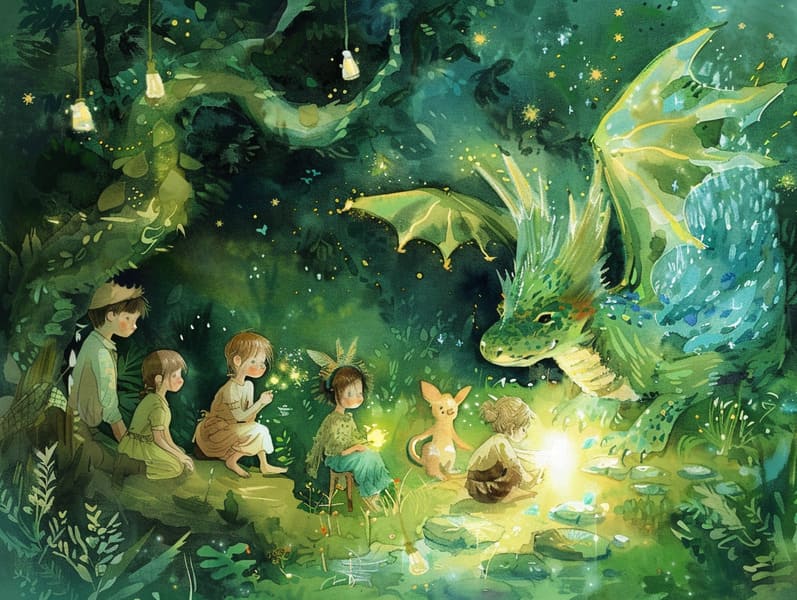Exploring the Joy of Nighttime Tales: Establishing Cherished Memories with Kids
Exploring the Joy of Nighttime Tales: Establishing Cherished Memories with Kids
Blog Article

The end of the day is a special time for parents and children. It’s a occasion to relax, nestle in, and revel in the enchantment of sleepy-time tales.
For ages, bedtime stories for kids have been a prized legacy, offering more than just a way to nod off. They provide an opportunity for relationship building, discovery, and sparking imagination.
The Meaning of Bedtime Stories
Evening stories for little ones mean more than a way to close the day. They play a key role in a child’s development and in reinforcing the caregiver-child bond. Here’s why they are beneficial:
1. Bonding Time: Nightly storytelling strengthens a special period of closeness between moms and dads with their little ones. It’s a moment of intimacy that helps children feel appreciated and comforted.
2. Language Skills: Listening to stories helps children develop their linguistic abilities. They gain new expressions, understand language rules, and boost their attention and analytical skills abilities.
3. Creative Thinking: Narratives for little ones transport them to fantastic worlds, stimulating creativity. They see characters, settings, and adventures, which stimulates their inventiveness.
4. Feeling Recognition: Kids' tales often involve characters facing trials and sentiments. These scripts help kids grasp and process their own feelings, developing feeling recognition.
5. Thinking Skills: Engaging with a story helps children develop awareness, remembrance, and problem-solving skills. They pick up to follow narratives, remember facts, and guess endings.
How to Make Bedtime Stories a Routine
Building a nightly ritual that incorporates narrating bedtime stories is doable and beneficial. Here’s how to ensure it becomes a valued part of your evening ritual:
1. Choose a Relaxing Place: Find a quiet place where you and your child can get cozy without distractions. A cozy bed or a quiet reading nook works well.
2. Choose a Set Time: Determine a specific time each night for tales. Uniformity helps children be accustomed and makes the tradition more manageable.
3. Pick Stories for Their Age: Choose tales that suit your child’s maturity. Little kids might be engaged by visual books with uncomplicated narratives, while older kids may like longer stories with more complex plots.
4. Interact with the Story: Bring the tale be captivating by doing different accents and voices, adding effect sounds, and motivating your child to be active. Ask details about the story to maintain their interest.
5. Create a Calm Atmosphere: Softly light the lights, use hushed tones, and create a relaxing environment to help your child wind down.
Best Sources for Bedtime Stories
There are numerous places to look where you can find wonderful bedtime stories for children. Here are some choices to consider:
1. Kids’ Books: Explore your community library or bookstore to find a great selection of bedtime stories for kids. Going through the aisles together can be a wonderful activity that also helps children to pick stories that appeal to them.
2. Web Sources: There are many internet sites that offer free bedtime stories. Sites like kids' story platforms provide a variety of short stories for kids that you can download. These sites are great for finding new and different stories without charges.
3. Audiobooks and Apps: For nights when you’re too worn out to read, explore audiobooks or storytelling apps. These can provide a relaxing voice to read your child a story, ensuring they still get their bedtime story fix. Apps often offer interactive aspects that can involve them further.
4. Personal Stories: Craft your own stories matching your child’s passions. Personalized stories can be especially engaging and meaningful. You can bring your child in the development process, making them a part of the adventure.
Why Brief Stories Are Best
Compact tales for little ones are particularly great for bedtime. They provide all the good points of longer stories but are more brief, making them perfect for getting ready for bed before sleep. Here’s why short stories are a great choice:
1. Simple and Clear: Quick stories are uncomplicated and understandable for kids, even after a long day. They can speedily grasp the tale and enjoy the story without losing interest.
2. Fast Engagement: Concise stories swiftly engage children, holding their concentration and creativity. This makes them suitable for keeping bedtime rituals efficient yet enjoyable.
3. Variety and Flexibility: Short stories offer for variety in your bedtime books. You can pick a different story each night, keeping the habit varied and awesome site exciting for your child.
4. Saves Time: For busy parents, brief tales are a efficient way to guarantee children still get their nightly dose of storytelling. They fit well into a packed schedule while still offering the full plusses of a bedtime story.
The Fascination of "Read Me a Story"
The simple phrase, “Can you read to me?” can offer a world of magic for children. Answering to this request not only caters to a child’s desire for attention and engagement but also establishes lasting memories. Here’s why it’s wonderful:
1. Tie: Reading to your child encourages a deep emotional relationship. It’s a time for closeness, sharing, and bonding.
2. Practice: Developing a bedtime story ritual creates a treasured tradition that children are excited for every night. It’s a habit that can be transferred through generations.
3. Mutual Learning: As you narrate, you’ll see your child’s advancement and progress. Their questions, reactions, and understanding of the stories change, offering insights into their developing minds.
4. Safe Space: Bedtime stories provide a safe space for children to understand emotions, face fears, and find comfort in the trusted presence of a parent.
In Closing
Kids’ bedtime stories are a vital tool for nurturing a child’s growth and building unforgettable times of connection.